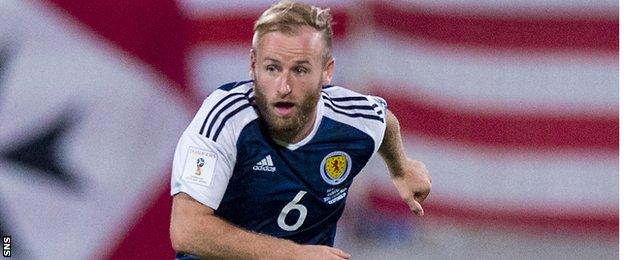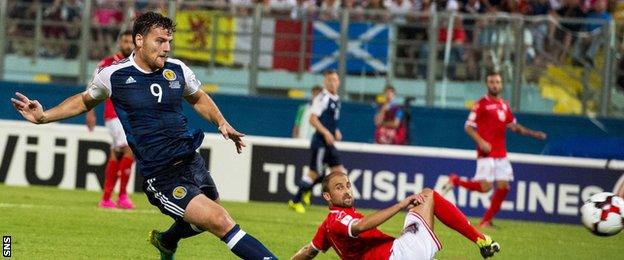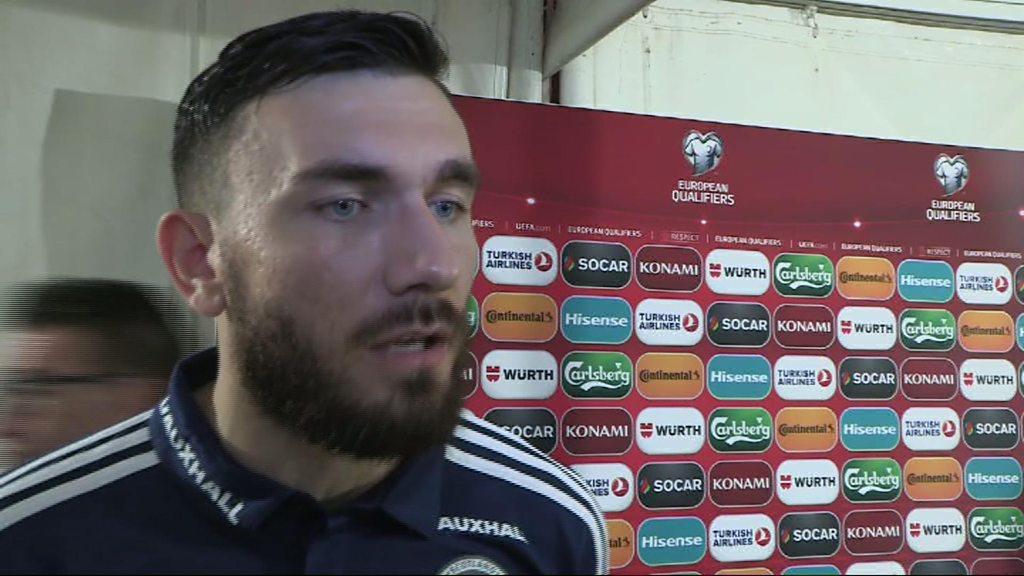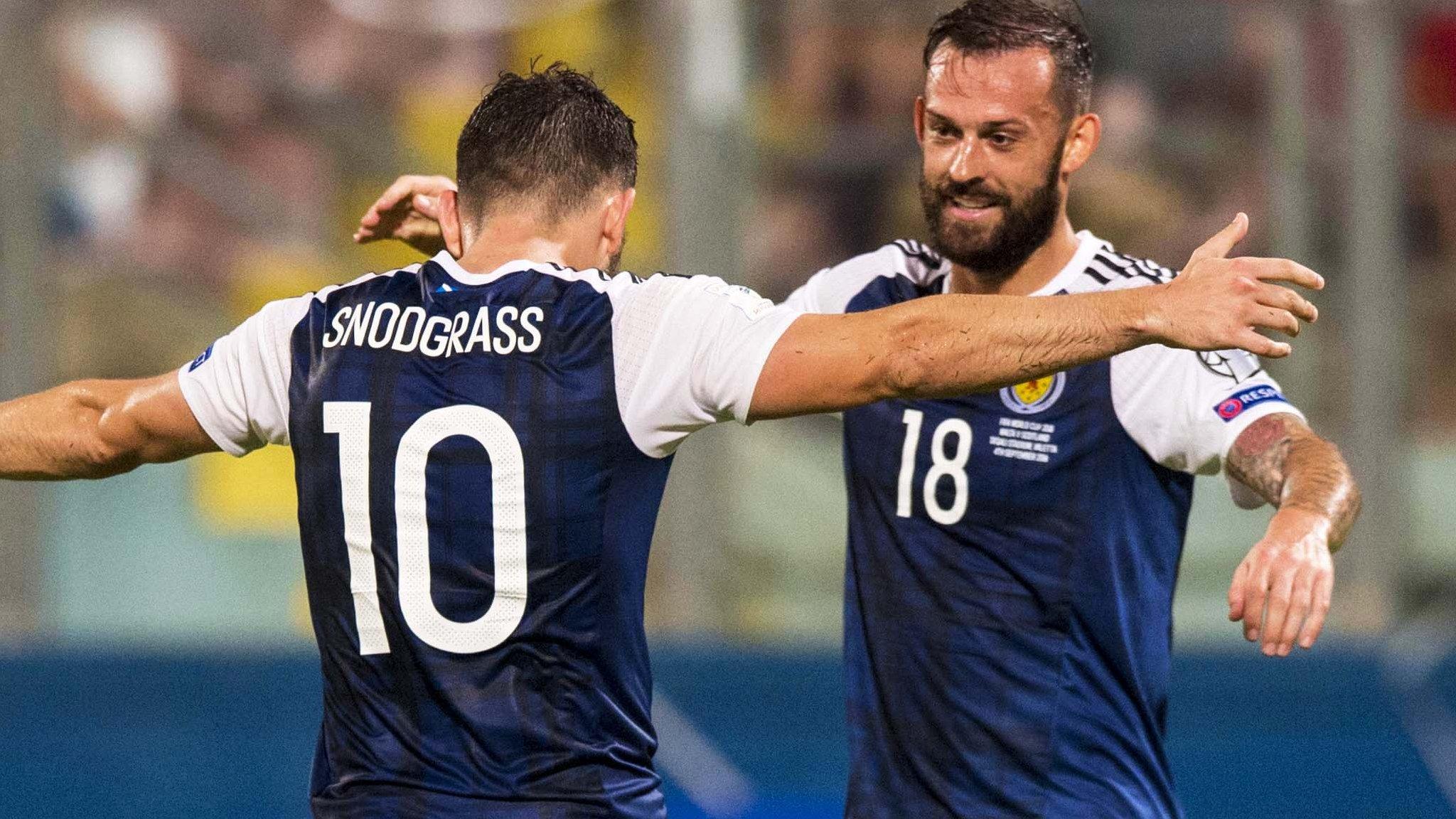Malta 1-5 Scotland: Gordon Strachan's men 'flung banana skin out of their road'
- Published

Strachan praised his side for showing 'mental strength' to recover from Malta's equaliser
The ghosts of failures past must have been swirling around Gordon Strachan's ears at half-time in Malta on Sunday night.
Scotland's early lead had gone, the sides were level at 1-1 and the frailties at the heart of their defence were evident again. "It was a crisis," said the Scotland manager, earnestly.
Crisis was a strong word to use, but it was Strachan's word and it was a revealing one. It spoke not just to the predicament his team were in against a nation ranked 176th in the world but also to Scotland's previous opening days in major championship qualification.
The 0-0 draw against Lithuania that got the Euro 2000 campaign off to a grim start. The 2-2 draw against the Faroes in the first round of matches for Euro 2004. The 0-0 draw with Slovenia in week one of the qualifiers for World Cup 2006.
The loss to Macedonia on the first day of the campaign to make the World Cup in 2010. The draw with Lithuania that put Scotland on the back foot straight away in the Euro 2012 qualifiers. The draw with Serbia that did the same for World Cup 2014.
Scotland failed to qualify for all those tournaments, as if anybody needs reminding.
"Everybody was concerned," said Strachan, about half-time in Malta. "But we had a bunch of lads who could deal with the stress."
Scotland had enjoyed 72.5% possession in that opening half and their dominance of the ball wasn't reflected in a dominance on the scoreboard.
This is not unusual when teams play Malta, but it's still unsettling at the time. Lots of possession doesn't always mean lots of goals. Malta can be slapstick but, on their very best days, they can also be stuffy.
Strachan would have known that. Maybe that's where the mention of a "crisis" came from, a realisation that while the minnows don't win matches, they do have the capacity, from time to time, to frustrate.
In the qualifiers for Euro 2016, Italy had 71% possession (and a one-man advantage for 46 minutes) against Malta and yet only scored once against them. In the return match, they had 70% possession and again they broke down their opponents only once.

Barry Bannan 'justified his selection' with a solid display in midfield
In the same group, Croatia had their issues with the Maltese. They, like Italy, had a one-man advantage, for 59 minutes, and enjoyed 70% of the ball but only scored twice, the second coming nine minutes from the end. In their second game with Malta, they had 64% possession and only won 1-0. Strachan had mentioned their stuffiness in the preamble. At half-time, that fear wouldn't have been far from his mind.
In fairness to them, Scotland picked up the banana skin and flung it out of their road. At 2-1, they had retaken control of the game, then they benefited from a horrific refereeing error that gave them a penalty they didn't deserve, a decision that also unjustly reduced Malta to 10 men with half-an-hour left.
In the Euro qualifiers, 10-man Malta managed to batten down the hatches against the 11 men of Italy and Croatia but they couldn't repeat the trick against Scotland. Strachan's team got seriously lucky with the penalty and the red card, but they made the most of it. Five goals is a hell of a return when so many would have settled for one, as long as it was decisive.
What did we learn from Scotland's win?
What did Sunday night tell us? It told us that Strachan's favoured centre-halves, Russell Martin and Grant Hanley, had better start playing games for their clubs - they're out of the picture at Norwich and Newcastle - before the next round of qualifiers in October. In a worrying opening half the pair of them were rusty and vulnerable, even to the pea-shooters of Malta.
It told us that Ollie Burke has a lot to offer, that in James McArthur's absence, Barry Bannan's surprise selection was justified and that in Leigh Griffiths' absence - and the increasingly perplexing omission of Ross McCormack - Chris Martin scored an important goal to make it 2-1.

Chris Martin scored his second Scotland goal, in his ninth international, to put them 2-1 up
It also told us that Matt Ritchie's delivery from out wide could be invaluable. Above all, it reminded us that Robert Snodgrass is not just a terrific footballer, but he's also a fine leader - and if there was luck involved in his hat-trick then it was not before time. Injury robbed him of 16 months of his career. The man is due some payback.
Scotland's record on the opening day of major championship qualifying campaigns is lamentable, but this team has spared itself the misery of its predecessors. They can look to Lithuania at Hampden on 8 October with a bit of confidence.
Like the Malta game, that's a must-win. Lithuania drew 2-2 with Slovenia on Sunday having led 2-0 after 34 minutes. They're already weakened by that result. Scotland can deal them a major blow by beating them next month. Prepare to forget about qualification if they don't.
We can only talk in ball-park numbers when trying to figure out how many points Scotland may need to make the play-offs - presuming that England, though hugely uninspired in victory against Slovakia, go on and win the group.
Robert Snodgrass: 'You've got to be ruthless at this level'
For the 2014 World Cup, Croatia, Iceland and France made the play-offs with 17 points. All the other nations that made the play-offs could have got there with 18, although some ended up with more than 18.
Four years earlier, and because Scotland's group was so lamentably bad - Norway finished second with a feeble 10 points, 11 points would have got a team to the play-offs. That was a highly unusual campaign, though.
Over those past two World Cup qualifying campaigns the 16 teams that advanced to the play-offs had an average of 20 points each. That's why home and away victories against Malta and Lithuania are vital. It's why Slovakia and Slovenia need to be beaten at some stage, home or away. Even then, Scotland may need to garner some draws to top up their total.
Scotland have been a mile off that standard. In the last three World Cup qualifying series they finished on 11 points (2014), 10 points (2010) and 13 points (2006).
Scotland being Scotland, even when they got off to a flier (Euro 2008 campaign) and had nine points out of nine (including a win over France) and 12 points from a possible 15 at the start, they still didn't make it. None of this will be easy, but it's not supposed to be.
The encouraging thing is that, on Sunday, they leaped over the first hurdle, an obstacle they usually thunder into before crashing to the floor. The barriers only get bigger from here. But, then, the prize, is pretty huge, too.
- Published5 September 2016

- Published4 September 2016

- Published5 September 2016

- Published4 September 2016

- Published14 January 2018
- Published7 June 2019
